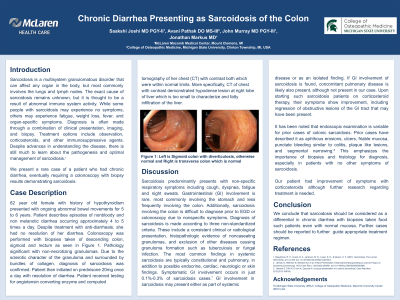Tuesday Poster Session
Category: Colon
P3147 - Chronic Diarrhea Presenting as Sarcoidosis of the Colon
Tuesday, October 24, 2023
10:30 AM - 4:00 PM PT
Location: Exhibit Hall

Has Audio

Saakshi Joshi, MD
McLaren Macomb
Mount Clemens, MI
Presenting Author(s)
Saakshi Joshi, MD, Avani Pathak, DO, Jonathan Markus, MD
McLaren Macomb, Macomb, MI
Introduction: We present a rare case of sarcoidosis involving the colon, emphasizing the importance of conducting further guidelines and research on the diagnosis and treatment of this condition.
Case Description/Methods: 62 year old female presented with ongoing abnormal bowel movements for 5 to 6 years. Patient described episodes of nonbloody and nonmelanotic diarrhea occurring approximately 4 to 5 times a day. Despite treatment with antidiarrheals, she had no resolution of her diarrhea. Colonoscopy was performed with biopsies taken of descending colon, sigmoid, and rectum. Pathology is significant with non-necrotizing granulomata. Due to the sclerotic character of the granuloma and surrounded by bundles of collagen, the diagnosis of sarcoidosis was confirmed. The patient was then initiated on prednisone 20mg once a day with a resolution of diarrhea. The patient received testing for angiotensin-converting enzyme and computed tomography of her chest (CT) with contrast both of which were within normal limits.
Discussion: Sarcoidosis predominantly presents with non-specific respiratory symptoms including cough, dyspnea, fatigue, and night sweats. Gastrointestinal (GI) involvement is rare, most commonly involving the stomach and less frequently involving the colon. Additionally, sarcoidosis involving the GI tract is difficult to diagnose prior to EGD or colonoscopy due to nonspecific symptoms. Diagnosis of sarcoidosis is made according to three non-standardized criteria. These include a consistent clinical or radiological presentation, histopathologic evidence of noncaseating granulomas, and exclusion of other diseases causing granuloma formation such as tuberculosis or fungal infection. The most common findings in systemic sarcoidosis are typically constitutional and pulmonary, in addition to possible endocrine, cardiac, neurologic, or skin findings. Symptomatic GI involvement occurs in just 0.1%-0.3% of sarcoidosis cases.1 GI involvement in sarcoidosis may present either as part of systemic disease or as an isolated finding. If GI involvement of sarcoidosis is found, concomitant pulmonary disease is likely also present. Upon starting patients on corticosteroid therapy, their symptoms show improvement, including regression of obstructive lesions of the GI tract that may have been present.
References
1. Ufondu O, Hillerson N, Shwetar MJ, et al. A Rare Presentation of Sarcoidosis Masquerading as Colonic Polyps on Screening Colonoscopy. ACG Case Rep J. 2022;9(6):e00800. doi:10.14309/crj.0000000000000800.

Disclosures:
Saakshi Joshi, MD, Avani Pathak, DO, Jonathan Markus, MD. P3147 - Chronic Diarrhea Presenting as Sarcoidosis of the Colon, ACG 2023 Annual Scientific Meeting Abstracts. Vancouver, BC, Canada: American College of Gastroenterology.
McLaren Macomb, Macomb, MI
Introduction: We present a rare case of sarcoidosis involving the colon, emphasizing the importance of conducting further guidelines and research on the diagnosis and treatment of this condition.
Case Description/Methods: 62 year old female presented with ongoing abnormal bowel movements for 5 to 6 years. Patient described episodes of nonbloody and nonmelanotic diarrhea occurring approximately 4 to 5 times a day. Despite treatment with antidiarrheals, she had no resolution of her diarrhea. Colonoscopy was performed with biopsies taken of descending colon, sigmoid, and rectum. Pathology is significant with non-necrotizing granulomata. Due to the sclerotic character of the granuloma and surrounded by bundles of collagen, the diagnosis of sarcoidosis was confirmed. The patient was then initiated on prednisone 20mg once a day with a resolution of diarrhea. The patient received testing for angiotensin-converting enzyme and computed tomography of her chest (CT) with contrast both of which were within normal limits.
Discussion: Sarcoidosis predominantly presents with non-specific respiratory symptoms including cough, dyspnea, fatigue, and night sweats. Gastrointestinal (GI) involvement is rare, most commonly involving the stomach and less frequently involving the colon. Additionally, sarcoidosis involving the GI tract is difficult to diagnose prior to EGD or colonoscopy due to nonspecific symptoms. Diagnosis of sarcoidosis is made according to three non-standardized criteria. These include a consistent clinical or radiological presentation, histopathologic evidence of noncaseating granulomas, and exclusion of other diseases causing granuloma formation such as tuberculosis or fungal infection. The most common findings in systemic sarcoidosis are typically constitutional and pulmonary, in addition to possible endocrine, cardiac, neurologic, or skin findings. Symptomatic GI involvement occurs in just 0.1%-0.3% of sarcoidosis cases.1 GI involvement in sarcoidosis may present either as part of systemic disease or as an isolated finding. If GI involvement of sarcoidosis is found, concomitant pulmonary disease is likely also present. Upon starting patients on corticosteroid therapy, their symptoms show improvement, including regression of obstructive lesions of the GI tract that may have been present.
References
1. Ufondu O, Hillerson N, Shwetar MJ, et al. A Rare Presentation of Sarcoidosis Masquerading as Colonic Polyps on Screening Colonoscopy. ACG Case Rep J. 2022;9(6):e00800. doi:10.14309/crj.0000000000000800.

Figure: Terminal ileum
Disclosures:
Saakshi Joshi indicated no relevant financial relationships.
Avani Pathak indicated no relevant financial relationships.
Jonathan Markus indicated no relevant financial relationships.
Saakshi Joshi, MD, Avani Pathak, DO, Jonathan Markus, MD. P3147 - Chronic Diarrhea Presenting as Sarcoidosis of the Colon, ACG 2023 Annual Scientific Meeting Abstracts. Vancouver, BC, Canada: American College of Gastroenterology.
